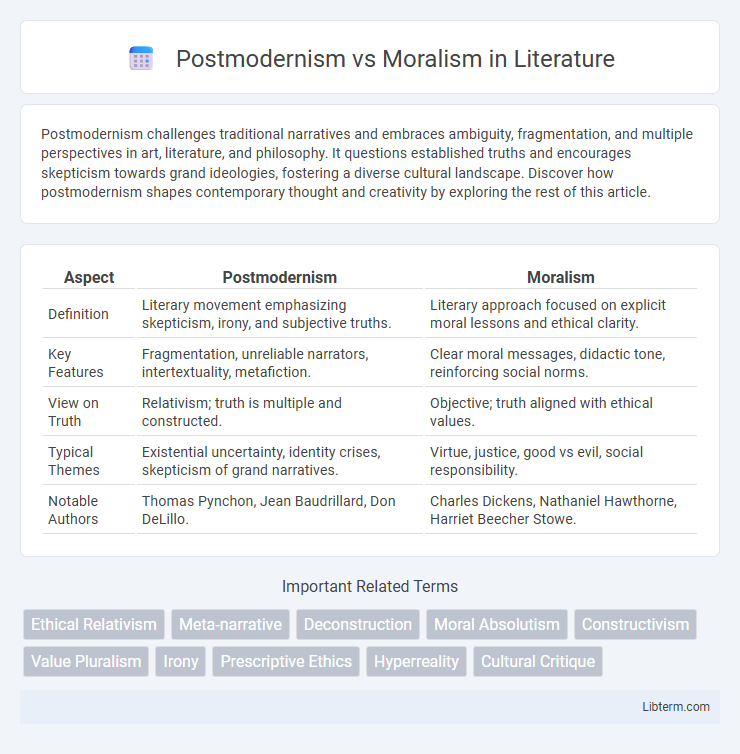Postmodernism challenges traditional narratives and embraces ambiguity, fragmentation, and multiple perspectives in art, literature, and philosophy. It questions established truths and encourages skepticism towards grand ideologies, fostering a diverse cultural landscape. Discover how postmodernism shapes contemporary thought and creativity by exploring the rest of this article.
Table of Comparison
| Aspect | Postmodernism | Moralism |
|---|---|---|
| Definition | Literary movement emphasizing skepticism, irony, and subjective truths. | Literary approach focused on explicit moral lessons and ethical clarity. |
| Key Features | Fragmentation, unreliable narrators, intertextuality, metafiction. | Clear moral messages, didactic tone, reinforcing social norms. |
| View on Truth | Relativism; truth is multiple and constructed. | Objective; truth aligned with ethical values. |
| Typical Themes | Existential uncertainty, identity crises, skepticism of grand narratives. | Virtue, justice, good vs evil, social responsibility. |
| Notable Authors | Thomas Pynchon, Jean Baudrillard, Don DeLillo. | Charles Dickens, Nathaniel Hawthorne, Harriet Beecher Stowe. |
Defining Postmodernism: Foundations and Features
Postmodernism challenges traditional narratives by emphasizing relativism, skepticism toward meta-narratives, and the deconstruction of established truths. Its foundations lie in critiquing Enlightenment rationality, highlighting the subjective nature of knowledge and the fragmented experience of reality. Key features include pastiche, irony, and intertextuality, which undermine the authority of fixed meanings and moral absolutes.
Understanding Moralism: Principles and Perspectives
Moralism, rooted in ethical absolutism, emphasizes adherence to universal moral principles and often critiques deviations from established norms as ethical failings. It prioritizes clear distinctions between right and wrong based on cultural, religious, or philosophical doctrines, advocating for moral responsibility and social order. This perspective contrasts with postmodernism's skepticism toward objective truths, as moralism upholds the existence of definitive moral standards guiding behavior and judgment.
Historical Context: Origins of Postmodernism and Moralism
Postmodernism emerged in the mid-20th century as a reaction against Enlightenment ideals and modernist certainty, emphasizing skepticism toward grand narratives and objective truth. Moralism, rooted in Enlightenment and religious traditions, prioritizes fixed ethical standards and prescriptive values dating back to classical philosophy and theological doctrines. The historical context highlights Postmodernism's challenge to universal moral principles, contrasting with Moralism's adherence to absolute ethical frameworks established across centuries.
Key Philosophers and Theorists in Both Movements
Postmodernism, championed by philosophers like Jean-Francois Lyotard, Michel Foucault, and Jacques Derrida, challenges grand narratives and emphasizes the relativity of truth and the deconstruction of language and power structures. Moralism, associated with thinkers such as Immanuel Kant, John Rawls, and Alasdair MacIntyre, focuses on ethical frameworks, universal moral principles, and the pursuit of justice grounded in reason and virtue. These contrasting movements reflect fundamentally different approaches to knowledge, truth, and ethical evaluation, with postmodernism prioritizing skepticism and pluralism, while moralism upholds normative standards and moral clarity.
Truth and Relativity: Contrasting Worldviews
Postmodernism challenges the notion of absolute truth by emphasizing the relativity and subjectivity of knowledge, asserting that truth is constructed through language, culture, and power dynamics. Moralism, in contrast, upholds universal moral principles rooted in objective truths and ethical absolutes that guide human behavior regardless of individual perspectives. This fundamental divergence creates a tension between the fluid, context-dependent insights of postmodern thought and the fixed, rule-based framework of moralism.
Moral Absolutism vs. Ethical Pluralism
Moral absolutism asserts fixed, universal ethical principles applicable across all cultures and circumstances, emphasizing unchanging standards of right and wrong. Ethical pluralism, favored in postmodern thought, recognizes the coexistence of diverse moral frameworks, valuing context and cultural differences in ethical decision-making. This contrast highlights postmodernism's critique of rigid moral absolutism, promoting a flexible, inclusive approach to ethics.
The Role of Language in Shaping Reality
Postmodernism views language as a fluid system that constructs reality through discourse, emphasizing the multiplicity of meanings and the instability of truth. Moralism treats language as a medium to convey fixed ethical values and objective truths, reinforcing societal norms and guiding behavior. The contrasting perspectives highlight how language either deconstructs or sustains reality by shaping perceptions and moral understandings.
Social Implications: Society, Culture, and Values
Postmodernism challenges traditional moral frameworks by deconstructing established narratives, leading to a pluralistic society where multiple cultural values coexist without absolute hierarchies. Moralism emphasizes adherence to fixed ethical standards, often promoting social cohesion through shared norms and reinforcing cultural identity. The tension between postmodern relativism and moralist absolutism shapes debates on social justice, cultural diversity, and the evolution of collective values in contemporary society.
Criticisms and Controversies in Both Camps
Postmodernism faces criticism for its perceived moral relativism and skepticism towards universal truths, leading to debates over the erosion of objective ethics and potential nihilism. Moralism, conversely, is often contested for rigid dogmatism and intolerance towards diverse perspectives, risking authoritarianism in enforcing subjective moral standards. Both camps grapple with controversies surrounding the balance between ethical pluralism and the quest for genuine moral frameworks in contemporary society.
Contemporary Relevance: Postmodernism vs Moralism Today
Postmodernism challenges established moral frameworks by emphasizing relativism, plurality of truths, and skepticism toward grand narratives, which contrasts sharply with moralism's adherence to fixed ethical standards and objective moral judgments. In contemporary discourse, debates between postmodernist critiques and moralist positions surface prominently in political polarization, cultural conflicts, and social justice movements, influencing public policies and societal norms. Understanding this tension is crucial for navigating issues like identity politics, freedom of speech, and ethical governance in today's complex global landscape.
Postmodernism Infographic

 libterm.com
libterm.com